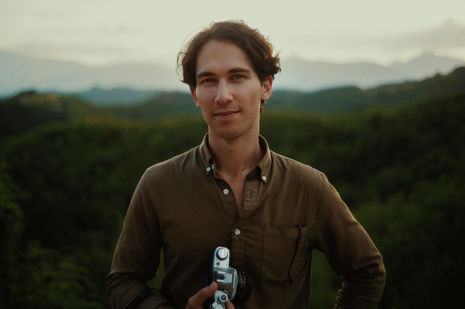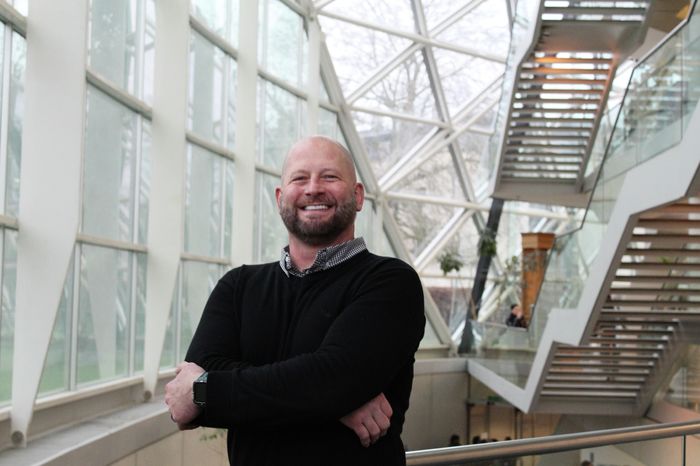Minco van der Weide on his documentary ‘Portraits of Philosophers’
Jasmine Heddle-Bacon and Vienna Kwan meet the man behind the student-led documentary, Portraits of Philosophers

Dutch-born filmmaker Minco van der Weide has an impressive CV, even by Cambridge standards. He is an alumnus of two film schools, with his own production company (Platonic Press) and IMDb credits that accompany his Cambridge qualifications. Despite this Linkedin-worthy profile, he felt like “something was lacking” – something that could satisfy his curiosity about the human condition.
A seed of inspiration planted by his former professor grew into the photobook and documentary project Portraits of Philosophers. His dual passions – film and philosophy –combine to produce black-and-white portraits of thirteen contemporary philosophers answering some of life’s biggest philosophical questions.
Portraits tasks these thirteen living philosophers, including Peter Singer and Daisy Dixon, with their reflections on “the essential questions of the human condition”. The documentary aims to “make philosophic inquiry more accessible” to an everyday audience by offering an intimate window into philosophy, through the lens of each interviewee. Of course, if Minco had the chance to “go back to the ancients,” he would definitely “ask Plato some questions”. Above all, however, he affirms that he’s more than happy with the thirteen selected, as they “simply make philosophy a beautiful subject”.
“Portraits tasks these thirteen living philosophers, including Peter Singer and Daisy Dixon, with their reflections on the essential questions of the human condition”
Minco’s former Cambridge Professor, Alex Carter, was the first person he selected to interview. “Alex was my introduction to philosophy. He instilled a kind of maturity in me, and on top of that, he’s a fantastic communicator.” He continues: “Alex knows how to talk about philosophy, in a way that makes it exciting but also accessible, which I think is a very important thing these days.” He explains that nowadays philosophic understanding often gets “distorted” by the focus on knowing everything about certain philosophers and forgetting the wider context of the history of ideas that they worked within. “What I tried to do [with the project] is to strike a balance between detail and accessibility. I wanted to really focus on things that are important to every living person.”
He refers to his time at Cambridge as formative, both for his own development and for the projects. The social elements of his MPhil in Digital Humanities – frequent formal dinners with people from “all sorts of disciplines,” the college system, and good friends – helped inform a plural understanding of the world.
What is his purpose driving the project? Is it to expand access to Philosophy, which is seemingly one of the most niche subjects (as any Philosophy student may tell you)?
“[I am] constantly reconfiguring my dream, but I think that’s part of the dream and the process”
He presses that a general grounding in the basic questions of philosophy make for “better citizens”. He continues that asking the questions that philosophers do “gives us more autonomy as decision makers,” particularly as “voters”. “If we could cut through populism’s rhetoric and become a more thoughtful society, that would be great.”
Minco’s creative decisions are deeply intentional. The use of black-and-white photography (shot with a Nikon ZF) solidifies the timelessness of the philosophical ideas explored. “I like the idea of […] creating an artefact in the form of a book that feels a bit timeless.”
Over two years, Minco traveled across continents, visiting philosophers in their homes and offices, asking them life’s biggest questions. The result is a beautifully structured narrative arc beginning with childlike curiosity and ending with reflections on mortality. It starts with asking ‘Why?’, exploring the questions “you might ask as a kid”. Then, Minco explains, it moves through questions of identity, choice, morality, mind, love, meaning, and finally, death. In a way, the interviews are a crash course guiding you through the human experience.
The process of making the documentary was an intense creative journey and one that broadened his own mental horizons. The two years dedicated to understanding and interviewing each philosopher left him with a “huge bucket” of new philosophical knowledge. He describes the decision making process as a series of lessons learned the “very” hard way, but one which has allowed him to grow as a person.
Minco’s project has a twofold purpose. “I want people to understand the importance of asking the right questions, rather than seeking specific correct answers,” a problem “all too pertinent” in the current age of hyperspecific digital technology and ChatGPT. He also wants to underscore the importance of philosophy in instilling the virtues and values that people live by.
As for what’s next, Minco is launching the photobook through Platonic Press, his publishing company, and running a kickstarter campaign to fund the first print run. Coming from “quite a bohemian upbringing,” with an artist father, Minco explains that following his dream in a creative field was encouraged, but not easy. “[I am] constantly reconfiguring my dream, but I think that’s part of the dream and the process.”
Perhaps it’s not about arriving at a destination, but about staying curious. In Portraits of Philosophers, Minco invites us to do just that – to stay curious, to ask questions, and to see philosophy not as an abstract discipline, but as a living, breathing practice.
 News / Colleges charge different rents for the same Castle Street accommodation2 March 2026
News / Colleges charge different rents for the same Castle Street accommodation2 March 2026 News / King’s hosts open iftar for Ramadan3 March 2026
News / King’s hosts open iftar for Ramadan3 March 2026 Theatre / Lunatics and leisure centres 4 March 2026
Theatre / Lunatics and leisure centres 4 March 2026 News / Angela Merkel among Cambridge honorary degree nominees27 February 2026
News / Angela Merkel among Cambridge honorary degree nominees27 February 2026 News / News in Brief: waterworks, wine woes, and workplace wins 1 March 2026
News / News in Brief: waterworks, wine woes, and workplace wins 1 March 2026








